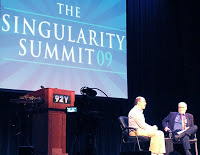
[Continuing coverage of the 2009 Singularity Summit.]
Next up: not a talk but a conversation between Stephen Wolfram, the mathematician and software developer, and Gregory Benford, the science fiction writer and astrophysicist. Wolfram starts by describing Wolfram Alpha, the recently-released search engine that is supposed to answer questions and not just provide search results.
Benford asks if the engine is “brute-force or something more subtle.” Wolfram takes a bit of offense. He says that if we can understand nature with a simple set of rules, maybe we can do the same with knowledge in general.
 Benford asks if there are any limits to this method. Wolfram goes off onto something else. He talks about searching through the space of possible computer programs, for ones of a certain type that can solve problems, rather than the having to go through the labor of humans programming something for a specific task. His meaning is more than a little unclear here.
Benford asks if there are any limits to this method. Wolfram goes off onto something else. He talks about searching through the space of possible computer programs, for ones of a certain type that can solve problems, rather than the having to go through the labor of humans programming something for a specific task. His meaning is more than a little unclear here.
Wolfram says we’re constrained to follow historical patterns of engineering, to only create things such that we have designed them with an understanding of what they will do. Nature, he says, doesn’t have this constraint. Alright, this make more sense. He’s talking about mining all potential programs, including useful ones that we ourselves might not have thought of. That’s quite an idea, and sounds like no small task to actually perform it.
Now he’s bringing it in the direction I thought he would — comparing the search among the space of possible programs to natural selection, which is the natural equivalent of searching the space of possible biological programs.
So now we’ve got a parallel: humanity attempting to recreate itself, but not knowing exactly how, and so setting out a program with the purpose of self-improvement. We would be as gods to our A.I. progeny. Wolfram goes on to say that the big question in A.I. is whether we can create programs that have purposes like we do.
(This raises so many interesting questions about God and destiny, but let me digress on a related sociological point: The cohort of transhumanists and Singularitarians seems to be made almost entirely of atheists. Yet they all seem to think that it is our destiny to transcend humanity. Where did this destiny come from?)
Now Wolfram is talking about whether we can search for our physical universe among the space of possible universes, and he’s going still another level “meta.” After you look at the enumeration of possible biological programs or computer programs, it’s a puzzling question why, if there are also other possible physical universes, just our one exists out of that possible set. He says he thinks that will turn out to be wrong question, and that when you remove any single perspective, it will turn out that all of the possible universes are equivalent.
There has been something a touch psychedelic about this talk. The aliens are waiting for us the sixth dimension.

Futurisms
October 3, 2009